What is Electrical Energy?
Electrical energy is the energy that is caused by moving electric charges. It is a form of kinetic energy that is generated when electrons move through a conductor, such as a wire. This movement of electrons can be harnessed to power various devices and systems.
How is Electrical Energy Generated?
Electrical energy can be generated through several methods, including:
- Chemical reactions, such as in batteries
- Mechanical energy, such as in hydroelectric power plants or wind turbines
- Thermal energy, such as in coal, natural gas, or nuclear power plants
- Solar energy, through photovoltaic cells
How is Electrical Energy Used?
Electrical energy is used in a wide variety of applications, including:
- Powering homes and buildings
- Operating electronic devices, such as computers, smartphones, and televisions
- Running appliances, like refrigerators, washing machines, and microwaves
- Powering transportation, such as electric cars and trains
- Operating industrial machinery and equipment
Key Concepts to Study
When studying electrical energy, make sure to understand the following key concepts:
- Electricity Generation: Learn about the various methods of generating electrical energy, including fossil fuels, renewable sources, and nuclear power.
- Circuits: Understand the components of an electrical circuit, such as conductors, insulators, switches, and the flow of current.
- Electrical Safety: Familiarize yourself with the importance of electrical safety measures to prevent accidents and injuries.
- Energy Efficiency: Explore ways to conserve electrical energy and use it more efficiently in everyday life.
Study Tips
To excel in your understanding of electrical energy, consider the following study tips:
- Hands-On Experiments: Perform simple experiments with circuits and electrical components to reinforce your learning.
- Real-World Examples: Observe and analyze real-world applications of electrical energy in your surroundings, such as in your home or school.
- Interactive Resources: Use interactive websites, videos, and simulations to visualize and comprehend complex electrical concepts.
- Review and Practice: Regularly review your notes and practice solving problems related to electrical energy to solidify your knowledge.
◂Science Worksheets and Study Guides Third Grade. Weather
Study Guide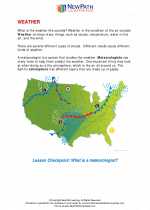 Weather
Weather  Worksheet/Answer key
Worksheet/Answer key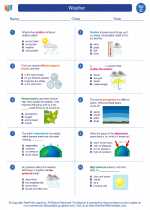 Weather
Weather  Worksheet/Answer key
Worksheet/Answer key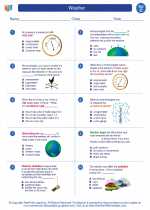 Weather
Weather  Worksheet/Answer key
Worksheet/Answer key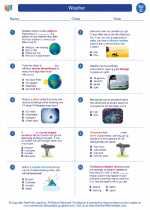 Weather
Weather  Vocabulary/Answer key
Vocabulary/Answer key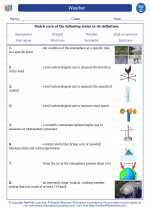 Weather
Weather  Vocabulary/Answer key
Vocabulary/Answer key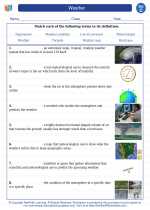 Weather
Weather 

 Worksheet/Answer key
Worksheet/Answer key
 Worksheet/Answer key
Worksheet/Answer key
 Worksheet/Answer key
Worksheet/Answer key
 Vocabulary/Answer key
Vocabulary/Answer key
 Vocabulary/Answer key
Vocabulary/Answer key

The resources above cover the following skills:
EARTH AND SPACE SCIENCE (NGSS)
Earth’s Systems
Students who demonstrate understanding can:
Represent data in tables and graphical displays to describe typical weather conditions expected during a particular season.